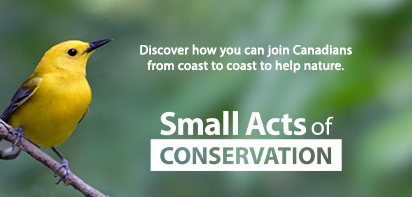Dr. Bill Freedman Nature Reserve expands with key coastal habitat
Nature Conservancy of Canada protects another section of popular High Head Trail
The Nature Conservancy of Canada (NCC) is announcing the expansion of an important private land conservation area within the Halifax Regional Municipality. The not-for-profit conservation organization has purchased 14 hectares of undisturbed coastal habitat: barrens and rocky coastline along a popular public hiking trail. With this key parcel of land at the Dr. Bill Freedman Nature Reserve, an additional 500 metres of the 4.8 kilometre High Head Trail is now protected. The new parcel of land, at an area known locally as Phantom Cove, brings NCC’s total conservation area to 132 hectares.
This coastal habitat serves as an important stopover area for migratory shorebirds, such as whimbrel, that forage on the barrens’ plentiful crowberries. Savannah sparrow and fox sparrow use the barrens for nesting while willets and bald eagles also frequent the area. Harlequin duck (federally a species of special concern and provincially listed as endangered), black scoter and long-tailed duck over-winter along the shoreline.
The reserve’s exposed granite barrens provide the necessary conditions and habitat needed for rare coastal plants, such as pink crowberry and knotted pearlwort. Other plants that thrive here include mountain holly and rhodora. Wild raisin, blueberry, huckleberry, bearberry and black crowberries, also found in the barrens, are abundant food sources for wildlife.
The granite rocky coastline and barrens play a vital role in purifying massive amounts of ground water prior to its re-entry in the ocean. Slope or runoff waters that drain directly into these coastal waters are important to biological productivity and influence plankton production in feeding areas for whales, dolphins and seals.
This important land conservation project was made possible thanks to the generosity of private donors. The project was funded in part by the Government of Canada's Target 1 Challenge Fund administered by the Government of Nova Scotia, the Nova Scotia Crown Share Land Legacy Trust, American Friends of Canadian Nature and the U.S. Fish and Wildlife Service through the North American Wetlands Conservation Act.
Projects such as this one are a testament to NCC’s leadership in accelerating the pace of conservation in Canada. In the past two years alone, the organization has influenced the protection of more than 1 million hectares (almost twice the size of Prince Edward Island), coast to coast to coast. Over the next few years, NCC will double its impact by mobilizing Canadians and delivering permanent, large-scale conservation.
In the face of rapid biodiversity loss and climate change, nature is our ally. There is no solution to either without nature conservation. The Nature Conservancy of Canada believes when nature thrives, we all thrive
Quote
“The twin crises of climate change and biodiversity loss are two sides of the same coin, and we must tackle them together. By working with partners like the Nature Conservancy of Canada, we are helping to protect the natural environment in Nova Scotia and across the country. Protecting land plays a vital role in helping to halt and reverse biodiversity loss and contributes to the recovery of species at risk. Through the Government of Canada's Target 1 Challenge Fund, we are taking action to conserve species at risk, as well as making progress toward its goal of conserving a quarter of land and water in Canada by 2025, working toward 30 percent of each by 2030." – The Honourable Steven Guilbeault, Minister of Environment and Climate Change
“Nova Scotia is fortunate to have a highly successful land conservation program led by partners like the Nature Conservancy of Canada who work closely with private landowners to protect more of our land and water. As we work towards our 20 per cent by 2030 conservation goal, the generosity of private land owners plays a vital important role in helping us reach this goal. Their gift to Nova Scotians living today and to future generations, also makes sure our province’s land – which they value and love – will forever retain its natural, ecological, scenic and personal significance.” – The Honourable Timothy Halman, Minister of Environment and Climate Change
"The expansion of the Dr. Bill Freedman Nature Reserve at Phantom Cove reflects the Nature Conservancy of Canada's deep commitment to preserving our vital coastal habitats and fostering a profound connection between people and nature. This well loved trail and invaluable site will be forever preserved, a precious gift for all who hold this extraordinary place close to their hearts and for the wildlife that call it home." – Jaimee Dupont Morozoff, NCC Program Director in Nova Scotia
Bill Freedman, PhD (1950–2015)
Bill Freedman was an author, ecologist, educator and Chair of the Department of Biology at Dalhousie University, where he also was professor emeritus. He volunteered with the Nature Conservancy of Canada for 25 years, leaving a conservation legacy across the country. He served as NCC’s National Board Chair (2008–2009) and a term as the Chair for the Atlantic Regional Board. Freedman authored more than 100 scientific papers, publications and science textbooks. In 2016, NCC renamed its Prospect High Head nature reserve in his honour.
Facts
- This year marks the 20th anniversary since the conservation charity first began conserving land at Prospect High Head.
- The High Head Trail runs along Shad Bay and the open Atlantic Ocean. With its fresh ocean breezes and panoramic vistas, it is wonderful hike in the summertime and an ideal place for birdwatching. It is located only a 30-minute drive from downtown Halifax.
- The Nature Conservancy of Canada now conserves approximately 9,009 hectares in southwestern Nova Scotia through the creation of 27 nature reserves.
About
The Nature Conservancy of Canada (NCC) is the country’s unifying force for nature. NCC seeks solutions to the twin crises of rapid biodiversity loss and climate change through large-scale, permanent land conservation. As a trusted partner, NCC works with people, communities, businesses and government to protect and care for our country’s most important natural areas. Since 1962, NCC has brought people together to conserve and restore more than 15 million hectares. In the Atlantic Provinces, NCC has protected 36,846 hectares. To learn more, visit natureconservancy.ca.
In Nova Scotia, the Government of Canada’s Target 1 Challenge funding flows through the Nova Scotia Department of Environment and Climate Change to conservation organizations and other partners to protect natural areas in the province. The partners include the Nature Conservancy of Canada, the Nova Scotia Nature Trust, Ducks Unlimited Canada, Unama'ki Institute of Natural Resources, The Confederacy of Mainland Mi'kmaq, Sespite'tmnej Kmitkinu Conservancy, Eskasoni Fish and Wildlife Commission, Town of Amherst and the Municipality of the County of Cumberland. The province can also use this federal funding for its land protection work.
Learn More
Follow us on on X (formerly Twitter): x.com/NCC_CNC | x.com/NCC_CNCMedia
Find us on Facebook
- 30 -




